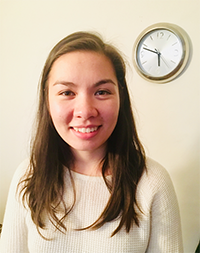 On her experience in the BEST program
On her experience in the BEST program
“The greatest piece of advice I took from the speakers was to be open to change and to the unexpected; not only to be ready to feel derailed at times, but to embrace the unforeseen opportunities and learning experiences (and fear) that these detours might offer.”
How did you hear about the BEST program? What made you want to apply?
I first heard about the BEST program when I served as a Graduate Community Fellow during my first year at Brown. At the time, I was really interested in learning about opportunities for engagement with the university beyond my department.
I grew up on a university campus and though academia has always been a part of my life, I realized that I had very little idea of what a university actually looked like on a global scale. I decided to apply to the BEST program in order to learn more about all the moving pieces in Brown’s universe and about how the graduate experience differs across disciplines. Additionally, as a member of the Diversity and Inclusion Oversight Board, I felt that a better understanding of higher education administration would highlight the active players on campus working to address concerns about diversity and inclusion and the difficulties they face in their positions.
How has or how will this program help you in your career or studies after Brown?
Participating in the BEST program has helped me consider an array of possibilities of which I was previously unaware, and thus, had no idea might be appealing to me both here at Brown and beyond. While I am not sure if I will pursue a career in higher education administration, I feel now, more than ever, assured of my desire to continue to proactively seek out personal and professional opportunities that put me in contact with other critical minds dedicated to improving the quality of higher education until it is accessible to all.
Who was your administrative sponsor and what did you learn or enjoy about working with them?
My administrative sponsor was Kisa Takesue, Director of Pre-College and Leadership Programs at Brown. In working with Kisa, I was able gain a better understanding of how Brown’s summer programs are run. I have always been interested in secondary education and continue to reflect on how my prior experience as a high school teacher contributes to my current work as an instructor at Brown. Learning about the pre-college programs that are offered here helped me to think more deeply and productively about how a career in higher education and my interests in secondary education can co-exist and benefit each other.
Did you complete a mini-practicum project? If so, tell us about the project and why you chose it.
I worked with Kisa to put together a course proposal for Summer@Brown that would both meet the needs and goals of the pre-college program and appeal to my field of interest within Hispanic Studies. Initially, the project came together as a way to take advantage of my prior experience working in secondary education and my desires to return to working with high school students. I have found the process to be even more productive given that it has challenged me to find innovative ways to open up my field of study to make it more accessible to a broader, more diverse, student demographic. Given the trends in enrollment in the humanities at colleges and universities across the country, I think that my conversations with Kisa about course design will prove to be very useful in the future when thinking about how to appeal to different student populations.
What piece of advice provided by the speakers resonated most with you?
After meeting and conversing with speakers who hold such prominent administrative positions at the University, I am struck by how candidly they spoke about the twists and turns their career paths took. At times, particularly during graduate school, the path forward feels very narrow and linear. The greatest piece of advice I took from the speakers was to be open to change and to the unexpected; not only to be ready to feel derailed at times, but to embrace the unforeseen opportunities and learning experiences (and fear) that these detours might offer.